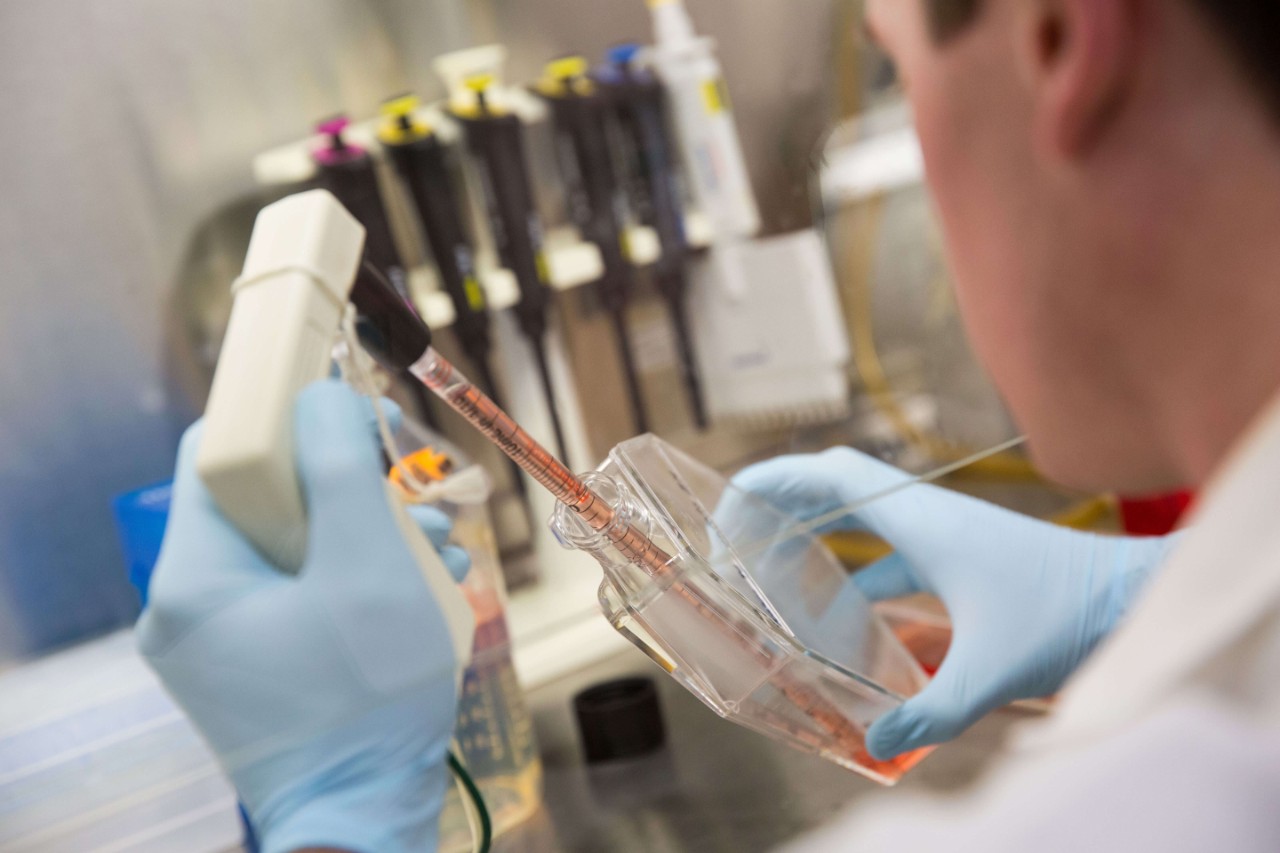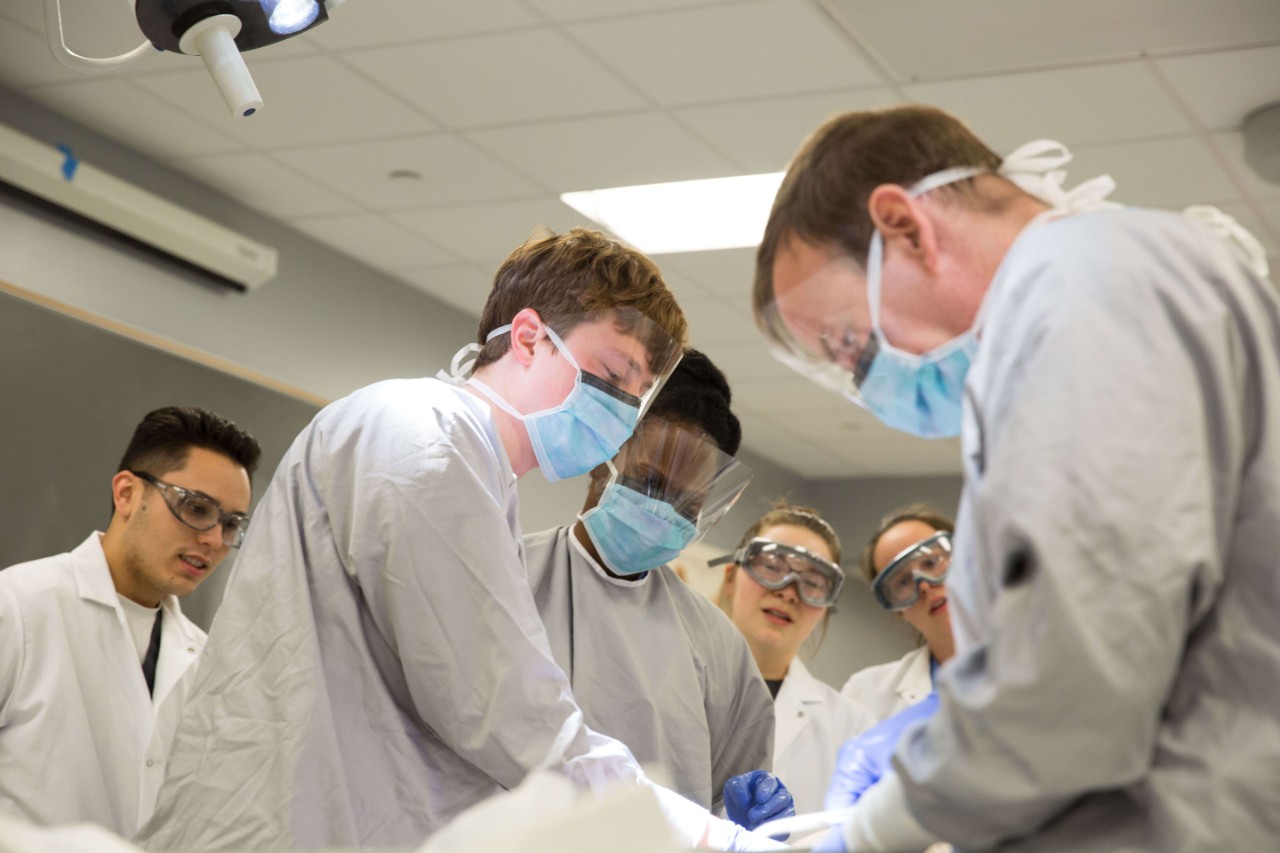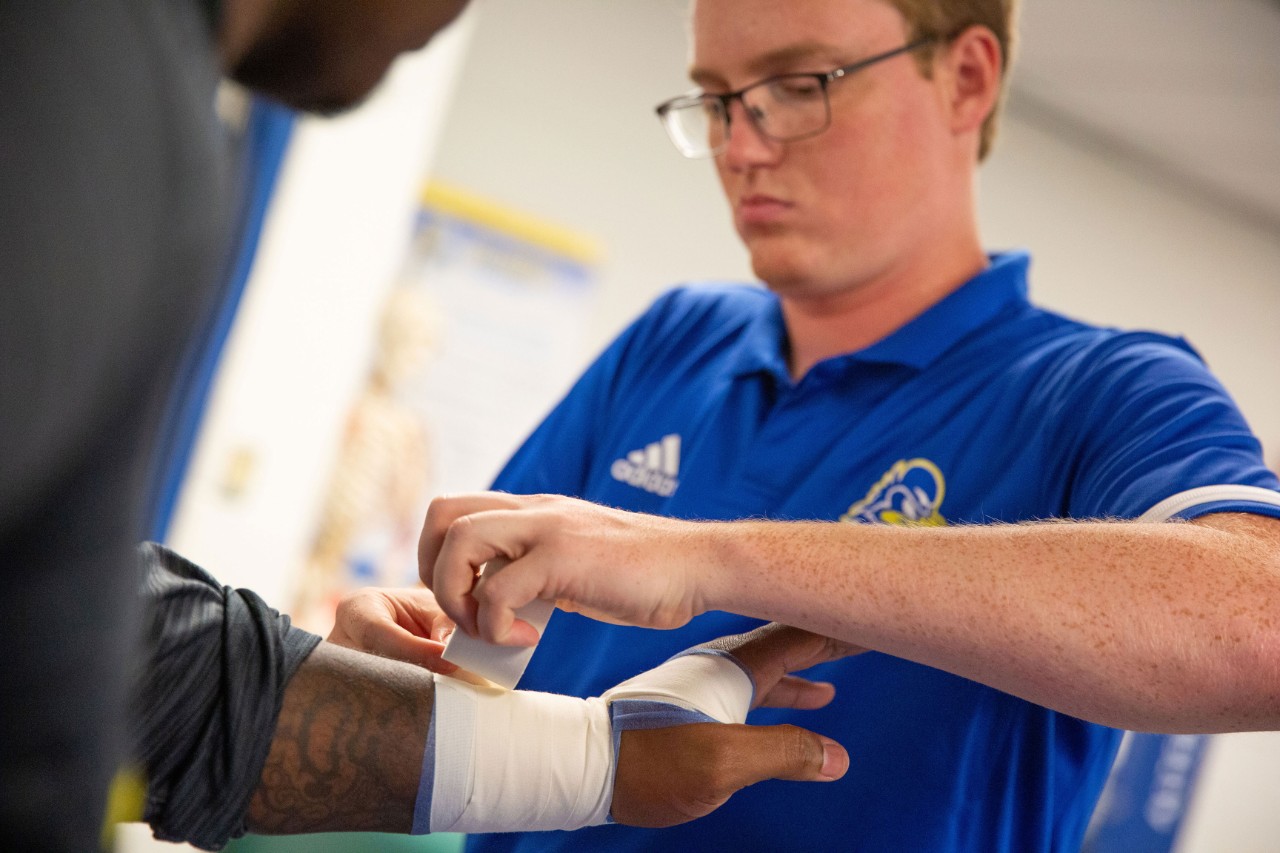

Undergraduate Programs
WELCOME TO THE COLLEGE OF HEALTH SCIENCES
The College of Health Sciences offers a dynamic range of undergraduate majors and minors through a robust curricula that enable students to pursue unique, hands-on research opportunities that impact the challenges facing healthcare today.
This minor is designed for students in majors outside of the department of Kinesiology & Applied Physiology who are planning careers in the health sciences and clinical fields and who wish to acquire knowledge regarding the mechanical, neurological, and physiological aspects of exercise.
Kinesiology Minor: Program Details
Program Director: Todd Royer
The interdisciplinary forensic science minor is designed to prepare students earning a Bachelor of Science degree in a life science or basic science for an entry-level position in the field of forensic science. In addition, this minor will appeal to students wanting a fundamental knowledge of forensic science who do not want a position as a forensic scientist. The minor provides students with an understanding of the judicial system, procedures for proper collection and preservation of physical evidence, laboratory skills, and knowledge about the methods of analysis of physical evidence. The minor requires a minimum of 18 credits. Students must earn grades of C- or higher in all required and elective courses.
The interdisciplinary minor in Genetic Counseling is designed to help students interested in pursuing a career in genetic counseling become well prepared to meet the criteria to apply for an advanced degree (MS) in genetic counseling. Genetic counselors are professionals who have completed specialized education in genetics and counseling in order to provide the personalized medical guidance patients may need as they make decisions about their genetic health. With the genetic testing market size predicted to double from 2020 to 2030, the number of genetic counselors is expected to grow much faster than the average for all occupations according to the US Bureau of Labor Statistics(followed by superscript 1).
The minor requires 22 credits plus prerequisites.*. All courses require a minimum grade of C-.
*Bureau of Labor Statistics, U.S. Department of Labor, Occupational Outlook Handbook, Genetic Counselors, at https://www.bls.gov/ooh/healthcare/genetic-counselors.htm (visited July 26, 2022).
Additional Resources:
- National Society of Genetic Counselors
- Become a Genetic Counselor
- List of Genetic Counseling Graduate Programs
- Bureau of Labor Statistics for Genetic Counselors
- Future Genetic Counselors Club
A minor in global health is the ideal background for any student interested in pursuing a career in health and healthcare. The courses will help students develop understanding of the influences of culture, environment, and nutrition on health practices and healthcare delivery throughout the world. There are three required courses (9 credits) that lay the foundation for understanding issues in global health and three elective courses (9 credits) that offer a personalized curriculum that builds to the student’s professional interests.
The Health and Wellness minor is for students who have an interest in expanding their knowledge of health and wellness issues. Courses will provide students with the knowledge, skills and experiences necessary to understand the role culture, gender, environment and behavior play in personal and community health. The minor will provide students with the opportunity to complement their major course of study by expanding and applying health knowledge and concepts to their chosen profession and personal life. Students in the Health Behavior Science major are not eligible to take this minor. A grade of C- or better in all required courses is necessary for successful completion of the minor. A maximum of nine credits may be from the student’s major or another minor.
Please contact the minor advisor with any questions.
Minor Advisor: Steve Goodwin (goody@udel.edu)
The Health, Physical Activity, and Disability (HPAD) minor provides students with a strong theoretical foundation and quality field-based experiences to support individuals of all abilities across the lifespan in various health and wellness settings. The minor is open to all students but is particularly suited for students pursuing careers in health and exercise sciences, such as health promotion, fitness, occupational therapy, therapeutic recreation, physical therapy, sports medicine, and coaching. Students applying for the minor must have completed at least one semester of full-time study at the University of Delaware with a minimum GPA of 2.0. A maximum of six credits may be from the student’s major or another minor.
Please contact the minor advisor with any questions.
Minor Advisor: DH Lee (dhlee@udel.edu)
A minor in Medical Diagnostics may be earned by a student in any University bachelor’s degree program through successful completion of a minimum of 15 credits as described below. This minor provides students, especially those preparing for admission to professional schools in medicine, dentistry, pharmacy and to graduate programs in related health fields, with the basic knowledge to evaluate and interpret clinical laboratory data. Before beginning these courses, the student must meet the required course prerequisites. Additional courses for satisfying the requirements for the minor may be approved by the Department. A minimum of C- is required in all courses completed for the minor.
The Department of Human Development and Family Sciences in conjunction with Behavioral Health and Nutrition offers a minor in Medical Social Services. Medical social services provide assistance to patients and their families with accessing available community resources. Professionals in this field connect people to appropriate social and/or medical services. Typical employment settings include hospitals, schools, hospice, and nursing home facilities.
A minor in Nutrition provides students in a variety of degree programs with a fairly intensive level of understanding of nutritional science. This minor is for students interested in the field of nutrition who believe that good nutrition and healthy lifestyle choices are important for the overall well-being of individuals. The program includes three core nutrition courses, two nutrition electives and requires four semesters of chemistry and, as such, is well suited for students in Biology, Chemistry and Food Science, as well as other majors. It is not available to students in the majors of Nutrition, Nutrition and Dietetics or Nutrition and Medical Sciences due to the extensive amount of course overlap.
A minimum of 15 credit hours with a minimum grade of C- is required.
Please contact the minor advisor with any questions.
Minor Advisor: Sandra Baker (bakers@udel.edu)
Public Health is the scientific field of study focused on preventing disease, promoting health, and prolonging life. This is achieved through the conduct of scientific research, implementation of health education programs and the organized efforts and informed choices of society, communities and individuals. A joint program between the Department of Behavioral Health and Nutrition and the School of Public Policy and Administration, the Public Health minor provides an interdisciplinary opportunity to develop practical skills in program development and increase knowledge in the areas of social systems, policy, and leadership. This minor offers a greater appreciation for the application of public health concepts to the student’s field of study.
The minor, available to students of all disciplines, requires 18 credit hours distributed as follows: Three required core courses (9 credits), and three elective courses (9 credits). At least six of the nine elective credits must be chosen from outside your major. All courses in the minor must be completed with a C- or better.
Please contact the minor advisor with any questions.
Minor Advisor: Laura Lessard (llessard@udel.edu)
This minor is designed to provide students with in-depth understanding of the theory and practical considerations associated with physical training to enhance strength and conditioning. Students successfully completing the minor will be prepared to take the Strength and Conditioning Specialist Certification examination offered by the National Strength and Conditioning Association.
Strength & Conditioning Minor: Program Details
Program Director: Jeffery A. Schneider



















